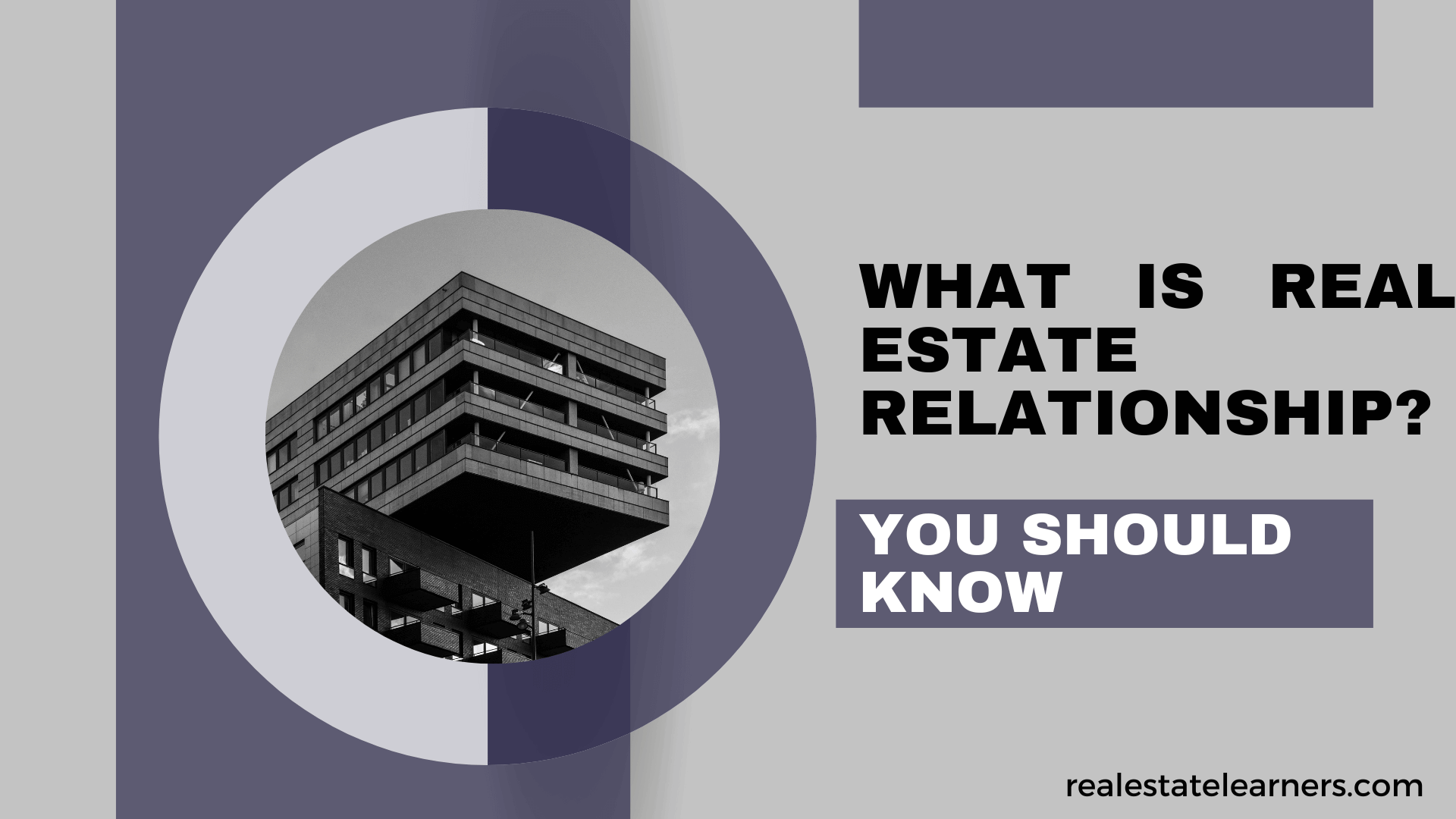In the world of real estate, relationships play a vital role in creating successful transactions. Whether you are buying or selling a property, having a good relationship with your agent can make all the difference. In this document, we will focus the importance of real estate relationships and and its types.
What is Real Estate Relationship?
Real estate relationship refers to the legal partnership between a real estate agent and their client. This relationship is created when a client seeks the services of a licensed real estate agent to assist them with buying, selling or renting property.
In order for this partnership to be successful, both parties must enter into an agency agreement which outlines the terms and conditions of their working relationship. This document is legally binding and serves to protect the rights of both the client and the agent.
Types of Agency Relationships
There are 3 main types of agency relationships in real estate:
Seller’s Agent or Listing Agent – represents the interests of the seller in a real estate transaction. They have a fiduciary duty to the seller and are responsible for ensuring that their client’s best interests are prioritized.
Buyer’s Agent – They represents the interests of the buyer in a real estate transaction. They also have a fiduciary duty to their client and work towards finding properties that meet their buyer’s needs and budget.
Dual Agent – They represents both the seller and the buyer in a real estate transaction. In this type of agency relationship, the agent must remain neutral and cannot act solely in the best interests of either party.
General agent real estate is a term used to describe agents who specialize in multiple types of agency relationships. They are able to represent both buyers and sellers, as well as act as dual agents if necessary.
Importance of Real Estate Relationships
Building strong real estate relationships is crucial for success in the industry. Agents who have good relationships with their clients are more likely to receive referrals and repeat business. This
It is important for the principal real estate to understand which type of agency relationship they have with their agent, as it can greatly impact how their property is bought or sold.
What are the elements of a real estate agreement?
A real estate agreement, also known as an agency agreement or contract, is a legal document that outlines the terms and conditions of the relationship among a real estate agent and their client. This agreement is important because it ensures that both parties are on the same page and have a clear understanding of their rights and responsibilities.
What are the parties Included in Real Estate Agreement?
The parties involved in a real estate agreement are the principal (client) and the agent.
Principal in real estate-
The principal is the client who is looking to buy or sell a property. They are usually the one who initiates contact with an agent and seeks their assistance in finding a suitable property, negotiating a deal, or marketing their property for sale. In some cases, the principal may also be an investor or developer looking to purchase land or properties for development purposes.
Agent in real estate-
The agent is the licensed professional who represents and assists the principal in their real estate transaction. They act as a mediator between buyers and sellers, providing them with guidance, advice, and expertise throughout the process. Agents have a fiduciary duty to act in the best interest of their client and are expected to provide honest and ethical service.
What is the difference between customer and client?
In real estate, the terms “customer” and “client” have different meanings. A customer is someone who seeks the services of an agent but does not enter into a formal agency agreement with them. They may work with multiple agents and are not bound by any contractual obligations.
On the other hand, a client is someone who has entered into an agency agreement with an agent. They have a formal relationship with the agent and are bound by the terms outlined in their agreement.
How is agency relationship created?
An agency relationship is created when a client and agent enter into a formal agreement. This can be done through written or oral communication, but it is always recommended to have a written contract in place to avoid any misunderstandings or disputes.
In some cases, an agency relationship may also be implied if the actions of both parties suggest that they are working together towards a common goal. For example, if an agent is actively marketing a property on behalf of a seller, it can be assumed that they have entered into an agency relationship.
How is agency relationship created?
An agency relationship is usually created through a written or oral agreement between the client and agent. This agreement outlines the terms and conditions of their partnership.
In some cases, an agency relationship may be implied if both parties act in a manner that suggests they are working together towards a common goal.
The principal must have the legal capacity to enter into an agency agreement, and the agent must be a licensed professional.
The agreement should clearly state the duration of the agency relationship, any specific tasks or duties assigned to the agent, and how they will be compensated for their services.
Both parties must sign the agreement to make it legally binding.
General agency in real estate is an important aspect of the industry and can greatly impact the success of a transaction. It is essential for both parties to understand their rights and responsibilities in this relationship, as well as the different types of agency relationships available.
How is agency relationship terminated?
An agency agreement can be terminated in several ways:
Expiration: The agreement comes to an end on the specified date stated in the contract.
Completion: The goal or objective of the agreement has been achieved, such as selling a property.
Breach: If one party fails to fulfill their duties outlined in the agreement, it may be terminated due to a breach of contract.
Mutual Agreement: Both parties agree to terminate the relationship and sign a mutual release form.
Termination by court order: In some cases, a court may order the termination of the agency agreement if there is evidence of fraud or misconduct.
It is very important for both parties to carefully review and understand the terms of their agency agreement before signing, as well as any clauses related to its termination.
Frequently Asked Questions
Q: Can I work with multiple agents at once?
A: Yes, you can work with multiple agents as a customer. However, if you want to enter into an agency relationship, it is best to choose one agent to represent you and your interests.
Q: What happens if I am not satisfied with my agent’s performance?
A: If you are not satisfied with your agent’s performance, you can communicate your concerns and try to resolve them. If the issue cannot be resolved, you have the option to terminate the agency agreement.
Q: Can an agent represent both the buyer and seller in a transaction?
A: Yes, an agent can act as a dual agent and represent both parties in a real estate transaction. However, this must be disclosed to all parties involved and may require written consent from both the buyer and seller.
Q: What is a fiduciary duty?
A: A fiduciary duty is a legal obligation that requires agents to act in the best interest of their clients and always put their needs above their own. This includes providing honest and ethical service, maintaining confidentiality, and disclosing any relevant information to their clients.
Conclusion
An agency relationship is an essential aspect of the real estate industry, as it ensures that clients receive professional and ethical representation throughout their transaction. It is important for both parties to understand the terms of their agreement and communicate effectively to establish a successful partnership. If you have any further questions about agency relationships in real estate, do not hesitate to consult with a licensed agent or seek legal advice.
References:
- National Association of Realtors. (n.d.). Agency. Retrieved from https://www.nar.realtor/agency
- Investopedia. (2020, August 18). Agent Definition. Retrieved from https://www.investopedia.com/terms/a/agent.asp
- The Balance Small Business. (2020, May 15). Real Estate Agent Duties and Responsibilities. Retrieved from https://www.thebalancesmb.com/real-estate-agent-duties-and-responsibilities-2866964 .

Corey has over 15 years of experience as a real estate broker and educator. He is dedicated to providing valuable insights and guidance for those looking to enter the real estate industry.

